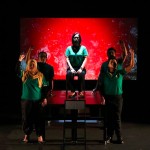“Double Bill: When The Cold Wind Blows/G.F.E.“
Reviewer: Jocelyn Chng
Performance: 13 July 2018
The subject matters surrounding this double bill strike one as decidedly gender-specific: 招: When The Cold Wind Blows (written by Neo Hai Bin and directed by Thong Pei Qin), deals with National Service (NS), while G.F.E. (written and performed by Chong Woon Yong and directed by Ric Liu) has a man recounting his first visit to the red-light district of Geylang. That said, on a broader level, the themes are relatable enough not to alienate half the audience.
Presented first, Cold Wind Blows portrays Xavier, a married man with kids and living overseas, still scarred and haunted by recurring nightmares of his NS experience for the past ten years. As the interaction unfolds between Xavier and a mysterious character from his army days known only as “Man”, we are slowly let on to the ghosts (literal and metaphorical) that have been constantly haunting him… but perhaps a bit too slowly. Much of the conversation early on revolves around Xavier trying to escape from his nightmare, but being told by the Man that he cannot unless he confronts a particular truth that he is ostensibly hiding from. As the play draws on, more details about his NS experience and his increasing disillusionment with the system are revealed. However, the dramatic trajectory of the play does not develop or vary sufficiently. By the time we get to the revelation of his inadvertent misdemeanour and subsequent demotion – understandably a source of great humiliation and pain – the revelation has lost its impact.
The play also suffers from an overreliance on dramatic lighting cues and some sight line issues, as the actors sometimes enter the L-shaped audience space.
The audience is herded out during the intermission, as the stage and seating configuration is re-set for G.F.E. The only remnant from the earlier play is a single red light bulb hanging down from the rig – an interesting if slightly random attempt to link the two plays.
In G.F.E., the narrative jumps back and forth between a man’s first visit to the brothels in Geylang and his various previous relationships in a non-chronological fashion. This is an effective device that juxtaposes his thoughts about his previous girlfriends with the “girlfriend experience” (or “G.F.E.”), which some sex workers are said to provide.
Surprisingly, and a bit disconcertingly, I find myself rather entertained by a story that is (at least partly) about prostitution. Self-written and performed, the play does not fall into the trap of self-indulgence that can all too easily ensnare such a work. Part of what makes the story so compelling is that Chong tells it as it is, without moralising, which sparks genuine reflection about the ethics of the world’s oldest profession and the people who patronise it.
It is especially heartening that the language used in both plays is unabashedly colloquial. Although described as Mandarin plays, both works actually make use of Mandarin and English to almost equal degree, with some Hokkien mixed in. Such confidence in using language that closely approximates the patterns of daily Singaporean speech is still rare in local theatre, where plays tend to stick mostly to one language – usually in an unrealistically formal or “standard” register.
In line with the Singapore Theatre Festival’s aim to develop new work, and this year’s thematic focus on the memoir or biography, the spunky confidence of these two new plays is certainly to be celebrated.
Do you have an opinion or comment about this post? Email us at info@centre42.sg.
ABOUT THE PRODUCTION
DOUBLE BILL: G.F.E / WHEN THE COLD WIND BLOWS by Wild Rice
12 – 15 July 2018
LASALLE College of the Arts, Creative Cube
ABOUT THE REVIEWER
Jocelyn holds a double Masters in Theatre Studies/Research. She is a founding member of the Song and Dance (SoDa) Players – a registered musical theatre society in Singapore. She is currently building her portfolio career as an educator and practitioner in dance and theatre, while pursuing an MA in Education (Dance Teaching).



